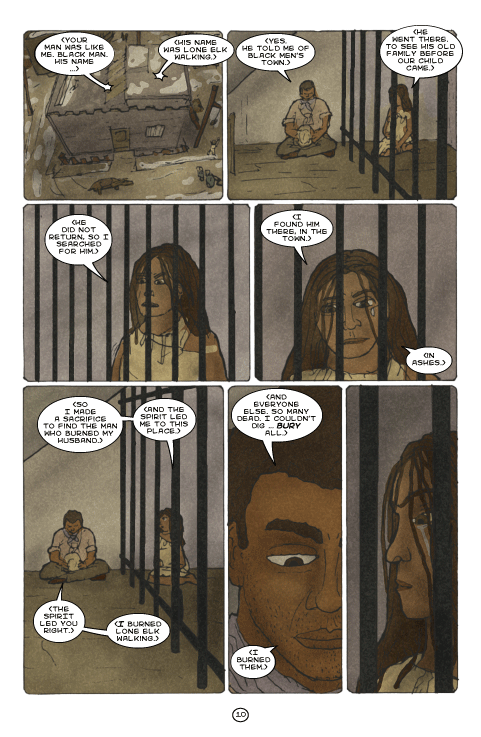I’ve been covering the App Store censorship story for some time in this blog, but it took a Norwegian victim for it to gain traction in our local main-stream media. The comic “Wakan Unwanted” by Lars S. Nygård and Seth Piper, distributed by Oxicomics, was rejected by Apple’s App Store for being ‘extremely racist’.
What was missing in the general press coverage was an independent assessment of the actual comic. Few things annoy me more than discussions that begin with “I haven’t read the work in question, but…” So when the illustrator (Piper) offered me the chance to read “Wakan Unwanted”, I took him up on his offer. And frankly, I can’t see where the App Store bureaucrats are coming from.
“Wakan Unwanted” is the story of the wanderings of a black protagonist through a steampunkish, alternate-history American West. The tagline “It’s December 1870. The adventures of the last black man in America are about to begin” says it all, really. The story is brutal and the language crass, but no more so than your typical spaghetti western. The main character is portrayed in a heroic light. While some might take offense at the back story of an African-American genocide, there are enough decent white people to go around.
As far as I can tell, the only thing that could have triggered the accusation of racism is the frequent use of the “n” word. If this is the case, the reasoning is disingenious indeed. While the word is deeply offensive when used in a current setting, there is no denying that it is part of our history and literature. It is certainly defensible to use the word in a graphic novel set in the American West in 1870s, even more so when the general tone of the work is evidently non-racist.
The imagery in Wakan Unwanted is not racist by any reasonable standard.
In Norway, accusations of racism are no small matter. Public statements that denigrate people on the basis of skin colour can potentially land you in jail for three years. The writer and illustrator are not comfortable with being labeled racists (and by extension criminals) by a global corporation, and in the Anakata Comics blog Lars writes:
We strongly believe that the folks over at Apple are misreading Wakan Unwanted. We have sent them some more background materials as well as an outline of where the story is going. Hopefully, this will clear things up.We strongly believe that the folks over at Apple are misreading Wakan Unwanted. We have sent them some more background materials as well as an outline of where the story is going. Hopefully, this will clear things up.
Let’s hope it will. But to me, this case is yet another reminder of the fix Apple has gotten itself into by including the infamous clause 3.3.12 in its iPhone SDK Agreement. By granting itself über-editorial power, Apple is condemned to repeat mistakes like this in its quest to rid the App Store of “obscene, pornographic, offensive or defamatory content or materials of any kind”.
The loss to the content producers affected is obvious. But ultimately, Apple also stands to lose. If not money, then credibility and reputation in its core “creative classes” market. Say what you will about censorship, but hip or cool it is not.

03/08/2010 at 21:29
In this article, Morten F. Thomsen of Oxicomics expresses that he _understands_ Apple’s initial reaction:
http://www.itavisen.no/847830/ekstremt-rasistisk
03/08/2010 at 21:38
@Pål: Well, it’s quite obvious that the artists do not. And frankly, I’m more concerned with their plight than the distributor’s.
03/08/2010 at 22:14
Just goes to show that people think racism should not be dealt with lightly. I would really like to hear what African-American people think of Wakan Unwanted. That concerns me more than your, Oxicomics’, the artists’ or Apple’s opinion. (Or my own, but I have not read Wakan Unwanted)
The fact that the artists’ intentions are pure, is not a guarantee for avoiding the perception of the comic as racist.
I believe the artists in this matter. I believe they are anti-racist, and that their intentions are pure. I also agree with Thomsen – I understand that this kind of entertainment may have to go som extra rounds in the approvement process.
03/08/2010 at 22:44
@Pål: Please don’t misquote people to bolster you own point of view. Thomsen does not express general support for “some extra rounds” in the story you link to. What he says is that he can understand Apple’s reaction in an American context. So can I, actually, without defending their practice. The problem is, Apple is a global corporation. They need to adapt to other cultures and sensibilities, and fast.
04/08/2010 at 00:17
“Please don’t misquote people to bolster you own point of view.”
I am sorry if my comment can be regarded as a misquote. He said he understood the initial reaction, sent more info, and believed that he could convince Apple with that. I think that could be understood as “one extra round”, at least, but maybe I chose the wrong words.
This is a graphic novel about America, Americans and American problems, written in English. Should it not be looked at it in an American context?
04/08/2010 at 07:12
@Pål: Not really, no. American culture – notably this part of it – went global a long time ago. I don’t know about you, but I played cowboys and indians as a kid, watched Italian Westerns filmed in Spain as a teen and read the hugely successful Western novels written by a Norwegian banker.
As for the problem of some people finding the language offensive, there’s a very simple solution available to Apple: Implement a ratings system. Rather than trying to filter out everything that could possibly be offensive to someone (a task which no government or private entity before Apple has succeeded at, BTW) you tell the customer that certain products contain strong language, violence or nudity, for instance.